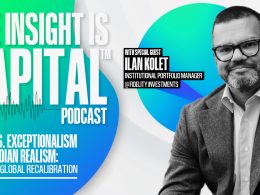Monday Update: Consumers Rocking, Business Rolling Over
by Brad McMillan, CIO, Commonwealth Financial Network
 Last week’s economic data showed that U.S. consumers continue to earn and spend while business continues to struggle. With both income and spending up, and surprisingly high levels of confidence, consumers are still driving economic growth. Business, on the other hand, has stepped back from the stronger results of the previous several months.
Last week’s economic data showed that U.S. consumers continue to earn and spend while business continues to struggle. With both income and spending up, and surprisingly high levels of confidence, consumers are still driving economic growth. Business, on the other hand, has stepped back from the stronger results of the previous several months.
Overall, last week’s numbers show that while consumers continue to do well, business is not yet ready to take a role in expanding the recovery.
Last week’s data
Income and spending. Kicking off a busy week for economic reports, personal income and spending data was released on Monday. In line with expectations, income increased by 0.4 percent, well above the May and June increases of 0.2 percent, which were both revised up to 0.3 percent. Personal spending was up 0.3 percent, also in line with expectations, but down from the June figure of 0.4 percent, which was revised up to 0.5 percent.
These strong numbers suggest that U.S. workers and consumers continue to do well. In addition, the savings rate bounced back to 5.7 percent from 5.5 percent, which demonstrates that this level of spending growth remains sustainable.
Consumer confidence. The strong income and spending data was bolstered by the Conference Board’s Consumer Confidence Survey, which came in much better than expected. It increased from 97.3 to 101.7—its highest level in almost a year—against an expected small decline to 97. Underlying details were also strong, with the present conditions index up to a nine-year high and the expectations index up as well, although more modestly. Labor sentiment also improved, suggesting job growth remains strong and wage growth is likely to continue to accelerate.
Manufacturing and industry. The news was not as good in the manufacturing and industrial sectors. The Institute for Supply Management’s manufacturing survey significantly disappointed, dropping from 52.6 to 49.4 and taking the index from expansion to contraction for the first time since February. Although this is concerning, regional surveys remain relatively positive and are more timely, and other surveys have been improving.
That said, this report leaves the manufacturing recovery in question, as the details were weak across the board. Only 6 of 18 industries expanded, while both production and (more significantly) new orders were down.
U.S. trade balance. Returning to the good news, the international trade balance surprised to the upside, with June’s deficit of $44.5 billion revised down by $5.2 billion. Most of the improvement was from trade in goods, suggesting that net exports might add to growth in the third quarter. In other positive news, exports rose by 1.9 percent, the most since early 2014, which should continue to boost overall economic growth.
Jobs. The most important economic news of the week was the employment report.
- Job growth came in at 151,000, below the expected level of 180,000.
- The average workweek declined by 0.1 hours, pointing to a further drop in labor demand equivalent to several hundred thousand jobs.
- The unemployment rate remained at 4.9 percent.
- Growth in average hourly earnings declined to 0.1 percent from 0.3 percent.
Though a weak report, it was not a disaster. The level of job growth is still high enough to absorb new entrants to the labor force and probably reflects some giveback from May and June’s very strong results, rather than a collapse in labor demand. It’s also worth noting that August has come in below expectations for the past five years, only to be revised up significantly later, suggesting some seasonal flaw in the adjustment process for estimates. Nonetheless, the report does call into question whether the strong gains of the previous two months can continue.
The week ahead
This week will be a quiet one on the data front.
The only major report is the ISM Non-Manufacturing survey, which tracks the service sector. Released this morning, it declined from 55.5 to 51.4—significantly worse than expectations. Although the index remains in expansion territory, it confirms the weakness of last week’s manufacturing survey and suggests that the business slowdown extends beyond the industry.
Have a great week!
Commonwealth Financial Network is the nation’s largest privately held independent broker/dealer-RIA. This post originally appeared on Commonwealth Independent Advisor, the firm’s corporate blog.
Copyright © Commonwealth Financial Network













